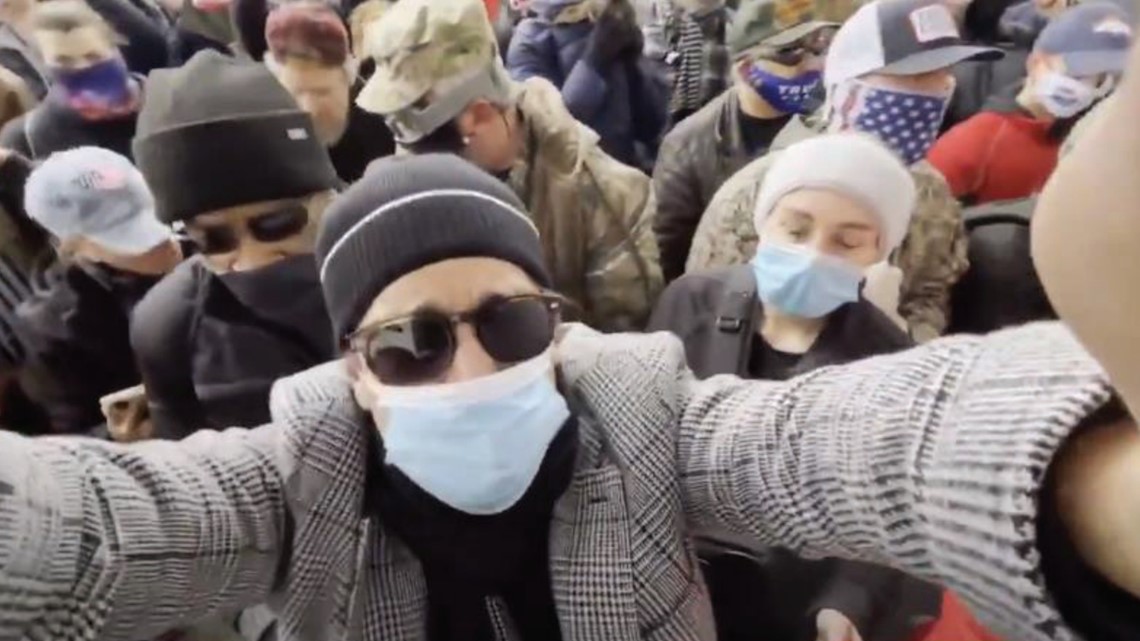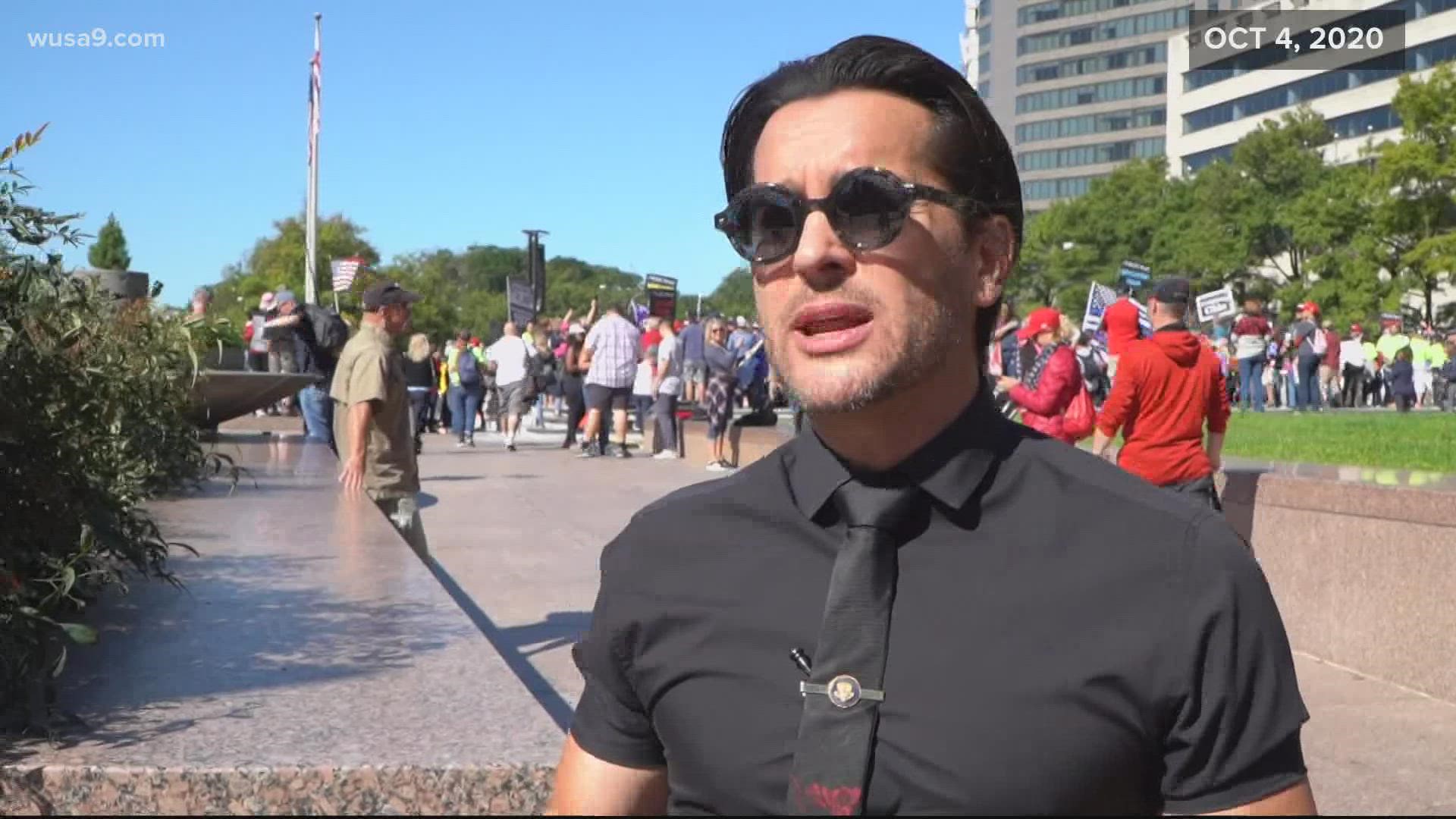WASHINGTON — A federal judge said right-wing activist Brandon Straka could potentially face a charge of making false statements if he continued to publicly downplay or deny elements of the plea agreement in his Jan. 6 case.
Straka’s attorney, Bilal Essayli, and federal prosecutors appeared before U.S. District Judge Dabney Friedrich on Wednesday for a status hearing to discuss the release last week of a sentencing memo detailing aspects of his cooperation with the government’s investigation into the Capitol riot. Straka, who was traveling to support Arizona Republican gubernatorial candidate Kari Lake before his scheduled speaking appearance at the Conservative Political Action Conference in Texas, was not present for the hearing.
In the memo, which Friedrich said had been unsealed due to “inadvertent human error” following a request by a press coalition, another attorney representing Straka at the time, Stuart J. Dornan, described the “significant information” he provided to investigators – including the names of 18 people Straka provided information about.
While some of what Straka provided was as simple as contact information for members of a “Stop the Steal” text thread, his attorney also described evidence of “potential criminal activity” and, in at least one case, the identification of an alleged Jan. 6 participant who was not previously known to the FBI. The names on the list included high-profile organizers of the “Stop the Steal” rally on Jan. 6 and other right-wing social media personalities with large followings.
Straka was initially charged with four counts, including a felony count of impeding law enforcement during civil disorder. In charging documents, prosecutors said Straka, who spoke at a "Stop the Steal" rally on Jan. 5, headed to the U.S. Capitol on Jan. 6 after receiving texts that the building had already been breached. Once there, videos show him encouraging other members of the mob to steal an officer’s riot shield and discussing his desire to enter the building — both elements included in the statement of offense he signed in September under penalty of perjury. After leaving the Capitol, prosecutors said, he posted messages encouraging rioters to “hold the line” and comparing January 6 to 1776.
“I’m completely confused. For 6-8 weeks everybody on the right has been saying ‘1776!” & that if congress [sic] moves forward it will mean a revolution! So congress moves forward. Patriots storm the Capitol – now everybody is virtue signaling their embarrassment that this happened,” Straka wrote in one tweet.


In January, Straka pleaded guilty to one misdemeanor count of disorderly and disruptive conduct in the Capitol Building or grounds and was sentenced to 90 days of home detention. In his Jan. 20 sentencing memo, Essayli stressed Straka’s cooperation with the government, writing that he gave two proffers to investigators and “provided information on individuals the government was investigating in separate cases.”
Since his sentencing, though, Straka has taken to multiple platforms to downplay his cooperation and his actions on Jan. 6 and to accuse the media of pursuing a “snitch narrative” against him. On Wednesday, Friedrich said she had also been made aware of statements in which Straka suggested he wasn’t being truthful when he entered his guilty plea.
“It’s been brought to my attention that Mr. Straka has been making questionable comments about the truth of his plea and the nature of his cooperation,” Fredrich said. “I want to know, should I be expecting a motion to withdraw his plea? Because I would gladly hold an evidentiary hearing.”
It wasn't the first time Friedrich has expressed doubt about Straka's guilty plea. During his sentencing hearing in January, Friedrich said Straka's portrayal of his role in the riot wasn't convincing.
“He wants me to believe he was there completely oblivious to what was going on around him, that he was just a peaceful protester, and it’s very hard to believe that based on his conduct and his statements,” Friedrich said.
Straka has posted about his plea multiple times on Twitter and other social media sites. In a March 8 post – written shortly after a jury convicted Texas Three Percenter Guy Reffitt in his Capitol riot case – Straka wrote, “I’ve been asked, ‘Why would you take a plea deal?’ Many who know me well feel certain I didn’t do things I was accused of.”
Five days later, responding to a tweet from Rep. Carlos Smith (D-FL), Straka suggested he hadn’t encouraged the mob to steal an officer’s riot shield – despite saying he did in his plea agreement.
“I signed a plea deal, written by the government, that says I did that,” Straka wrote, adding that it was “completely contrary to who I am and what I would do in any given situation.”
On May 3, Straka asked another Twitter user: “Do you believe that every person who takes a plea deal did the things they’re accused of?” And on June 11, Straka shared a political cartoon depicting the D.C. jury that acquitted former Clinton campaign lawyer Michael Sussman wearing “Vote Democrat” shirts and holding anti-Trump signs, writing, “Why did you take a plea deal, Brandon? If you were innocent, why didn’t you fight the charges?”
Essayli assured Friedrich Straka did not want to withdraw his plea, but then had to face more questions about Straka’s ongoing attempts to minimize his cooperation with the FBI.
On Thursday, after WUSA9’s piece was published, Straka made a lengthy post on Facebook claiming he was “being punished for telling my story” and saying what he told the FBI amounted to saying “my friends did nothing wrong.”
In the same statement, which was also posted to the right-wing social media website Gettr, Straka wrote, “There is NOTHING WRONG with talking to the DOJ and telling them your friends are innocent.”
Straka also spoke to supporters for more than two hours on Twitter Spaces on Sunday – specifically highlighting his frustration that some think “that somehow Simone Gold is in prison because of me.”
Gold, a doctor and anti-vaccine advocate, pleaded guilty in February to entering the U.S. Capitol Building on Jan. 6. She was sentenced last month to 60 days in jail.
In a memo filed by the Justice Department on Jan. 13 and unsealed last week, prosecutors said Straka provided the FBI with voicemail messages from Gold that aided in her prosecution.
“The information contained in the voicemail messages is valuable in the government’s prosecution of Gold and may assist in a plea resolution of the Gold prosecution,” assistant U.S. attorney Brittany Reed wrote.
Friedrich said Straka’s post-sentencing statements opened possible “exposure for making false statements to federal law enforcement officers” and made her doubt the sincerity of his plea.
“It makes me question every statement he made to me at the time of sentencing. Every single one,” Friedrich said. “He’s losing more credibility by the moment.”
“What he needs to appreciate is he is potentially incriminating himself for a 1001 prosecution,” she added.
Friedrich was referring to 18 USC § 1001 – a portion of the federal criminal code that makes it a crime to knowingly and willfully “make any materially false, fictitious or fraudulent statement or representation” to a federal agent. The charge, commonly used in cases where defendants are suspected of lying to the FBI, is a felony that carries up to 5 years in prison. According to former federal prosecutor Neama Rahmani, in a case like Straka’s involving significant cooperation with the FBI, such false statements could potentially undermine the entire basis of Straka's plea.
“Every plea agreement has a factual basis in it. Every plea agreement,” Rahmani, who is now the president of West Coast Trial Lawyers and author of the forthcoming memoir “From Harvard to Hashtag,” said. "During the change of plea hearing, the magistrate or the district judge, they actually make the defendant admit to the factual basis for the guilty plea. And it’s done under penalty of perjury, too. So the fact that you have a defendant who’s now denying the factual basis of a plea, it does create the potential for a false statement or even a perjury prosecution.”
Rahmani said prosecutors would likely be more concerned about how Straka’s post-sentencing statements affected the credibility of the information he’d given them.
“Even if you’re lying about lying, now you’re creating impeachment evidence against yourself,” Rahmani said. “Now the government can’t put you on the stand like they could have before because your credibility is shot. He’s undermined his credibility and his cooperation and his testimony.”
Rahmani said Straka’s statements suggesting he was innocent or denying information from his plea agreement could constitute a probation violation and violate a term in his plea agreement about making “false statements or declarations.”
“Your client understands that any perjury, false statements or declarations, or obstruction of justice relating to your client’s obligations under this Agreement shall constitute a breach of this Agreement,” the plea document says.
Friedrich told Essayli on Wednesday that Straka’s post-sentencing behavior had generated a “forthcoming” report from his probation, although she did not describe the expected contents of that report.
“I suggest you advise him to show the discretion that he did not show before Jan. 6,” Friedrich told Essayli.
A number of other documents in Straka’s case remain pending review before Friedrich rules on whether to unseal them. On Wednesday, she extended the deadline for that review – which had been set for Friday – but told Essayli she planned on unsealing at least portions of a transcript of a Jan. 20 pre-sentencing hearing detailing more of Straka’s cooperation in the case.
We're tracking all of the arrests, charges and investigations into the January 6 assault on the Capitol. Sign up for our Capitol Breach Newsletter here so that you never miss an update.

